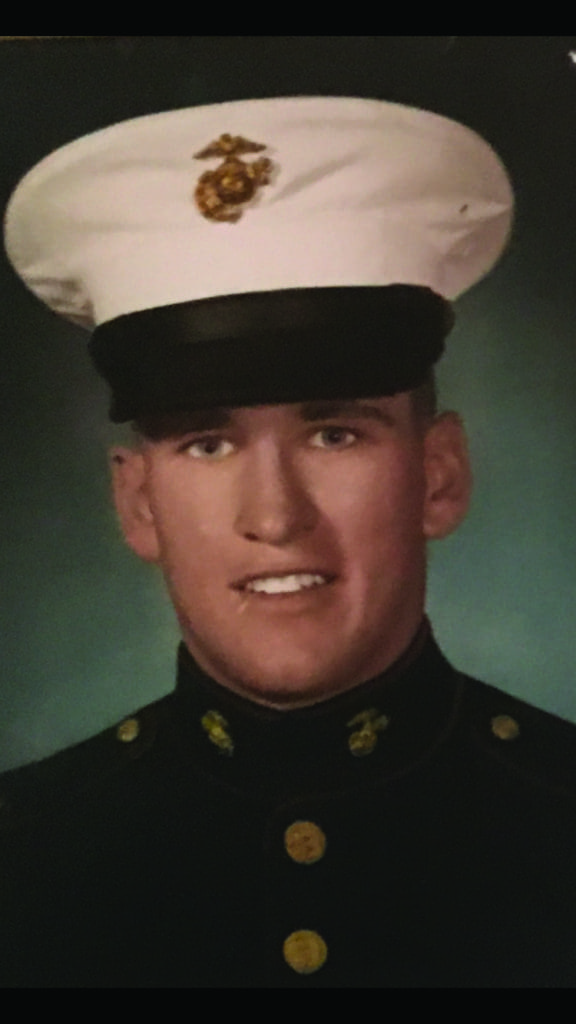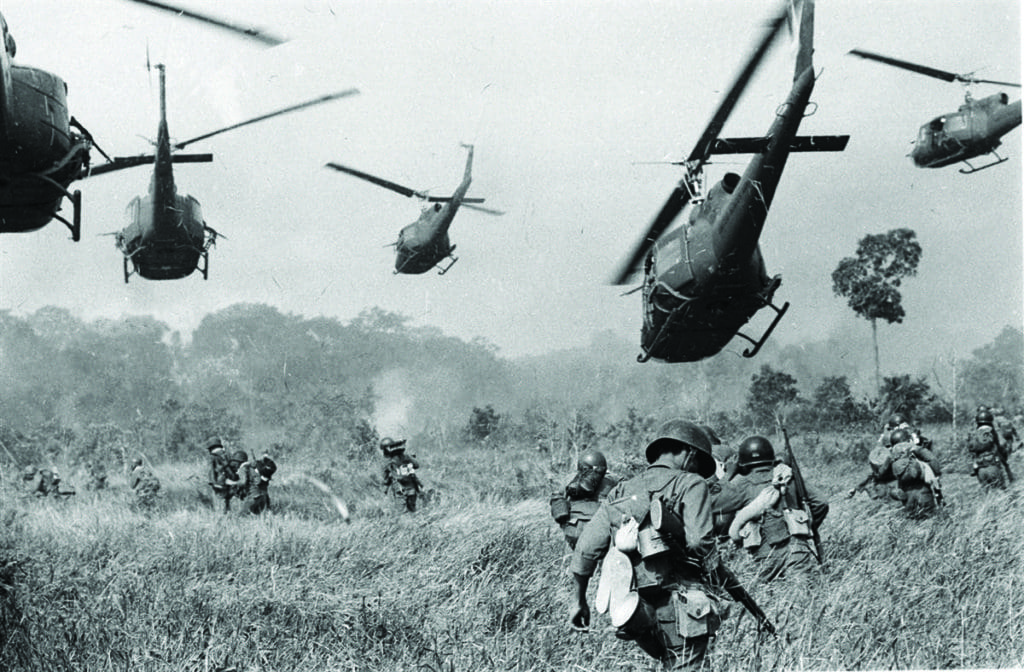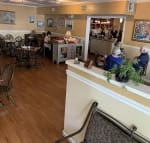The Dark Side
By Daniel Myer
Half a century ago, Chuck McLaughlin
started Marine Corps basic training.
Eight months later, in April of 1967,
North Vietnamese artillery fire bombarded Chuck in some of the most intense fighting
of the Vietnam War. Unlike most of his
comrades, Chuck volunteered to be there.
Now as a Lighthouse Point resident for over four decades and the beloved owner of Lighthouse Point’s Bonefish Mac’s Sports Grille, Chuck is
a long way from Vietnam. His stories, however, transcend both geography and time.

Chuck volunteered to join the Marine Corps and was sent to boot camp at Parris Island, South Carolina. There, amidst the old, odorous World War II era buildings, he met up with his brother and underwent rigorous training. Chuck and his brother learned one of the most important lessons a Marine can learn.
“They trained you to be a team. It was not about you,” said Chuck, “At times they’d say, ‘we don’t care about you, we care about the guy to your left and we care about the guy to your right, so take care of them.’ They made us a team. It was the best team I was ever on.”
During boot camp, each new recruit was evaluated to determine what talents they could bring to the Marine Corps. While Chuck wasn’t exactly at the top of his high school class, his prep school education was obvious. The recruits placed him in a new and foreign field: computers. At the time, computers were virtually unknown to the general public. Man had yet to land on the moon.
From Parris Island, Chuck went to a specialty computer school in Montford Point, North Carolina, where he learned how to use this alien technology in Vietnam for requisitioning materials. Previously, requisitioning materials was a lengthy process prone to error, but the transition to computers would expedite the process. From boots to jets, computers would make getting new materials to the troops exceptionally fast.
Chuck knew the technology would revolutionize the war in Vietnam. Helicopters, computers, jets, napalm and amphibious tanks marked a new era. New machines and equipment meant new ways to wage war.
After his basic technological training in Montford Point, Chuck underwent advanced training in South Carolina and was “West Pac’d,” meaning he received a ticket from Western Pacific. According to Chuck, if you were “West Pac’ed” you were going to Vietnam. Chuck didn’t mind so much; He was told that as a computer specialist he would be sent to a safe, secure and air-conditioned area far from the front lines. With this cushy vision in mind, Chuck volunteered to go.
There was another silver lining to going to Vietnam: American military policy dictated that two brothers could not serve in the same location. Therefore, when Chuck elected to go to Vietnam, his brother was reassigned and sent to Guantanamo, Cuba. If Chuck had not taken his place, Frank would have been deployed in the 9th Marine Division, a division many Marines knew as “the walking dead.” The 9th division suffered heavy casualties as a consequence of killing Ho Chi Minh’s son in battle. Ho Chi Minh, the grieving leader of the Viet Cong, had a personal vendetta against the division. Frank still reminds Chuck to this day that he most likely saved his life by taking his place.
On his way to Vietnam, Chuck underwent survival, jungle and prisoner-of-war training at Camp Pendleton in California, then underwent the last of his preparation in Okinawa.
“You fly to Okinawa,” said Chuck. “You get a little bit more training and processing. They make sure you have your blood type right because you’re heading out. You’re going to the dark side.”
Particularly Savage
Chuck boarded a plane to “the dark side,” expecting that when he landed he would be shown his cushy computer station. When he landed in Da Nang, Vietnam, though, he found nothing plush waiting for him. Chuck reported to a commanding officer that he was there to work with computers, to which the officer replied, “what in the hell is a computer?”
In a few days time, Chuck was told to get on a helicopter. He had no idea where he was headed or why. He simply did as he was told.
“I was the smart guy that knew nothing,” said Chuck.
When he arrived in Phu Bai, Vietnam, which was located in one of the most extreme and dangerous regions of the war zone (an area called I-Core), he was once again informed that the base didn’t have any computers. He was instructed to board yet another plane.
With about a dozen other Marines, Chuck climbed inside the metal stomach of the C-130 airplane, which had no seating or restraints. The plane’s loadmaster came into the hold and threw a bullrope down the center. He told the men aboard to wrap the rope around their right arm and leg before take off. The plane lurched forward and began to taxi the runway with the massive back door only a quarter way closed. The men clung tightly to the bullrope and watched the lights of Phu Bai camp disappear through the open rear.
The flight was not smooth. The pilot had to weave unpredictably at times in order to avoid enemy fire. Chuck knew he should be afraid of being thrown from the back of the still open C-130, but he was so exhausted he could barely think.
Not long into the flight, a green light in the C-130’s hold turned on. Chuck felt the plane descend and his stomach went with it. He knew the plane was going to be landing in the dark and was likely to be fired upon. The plane landed and slowed, but never stopped. The loadmaster pushed Chuck out the back of the still moving C-130 along with the other fresh Marines and some equipment. The fall knocked the wind out of him. Chuck lied sprawled out, gasping for breath like a fish out of water. The runway was pitch dark.
Chuck was still trying to pull air into his lungs when a bright light hit him in the eyes. Another Marine with a flashlight (bent 90 degrees downward as all government issued flashlights were) had seen Chuck lying there and yelled to him to move out of the runway or risk getting crushed by the same plane he’d just been thrown out of.
Chuck quickly and anxiously followed the Marine underground through a series of tunnels to avoid possible enemy fire. Once on the other side, the Marine showed Chuck a tent and told him to take the first cot inside. Happy to finally get some rest, Chuck fell asleep in the blink of an eye.
It hadn’t even been an hour before Chuck was abruptly awoken by men shouting “Incoming! Incoming!” Chuck ran outside to see what was happening. The sleep in his eyes was quickly replaced by the smell of gunpowder in his nose and the heat of artillery fire on his brow. A 140mm rocket hit the ground just 50 yards in front of him. Shrapnel flew around him.
“It was like the Fourth of July,” Chuck said.
He stumbled his way to an officer’s bunker. As he entered, it struck him that nobody there knew who he was. An old gunnery sergeant shouted to the Marines to get to their positions and return fire, but Chuck, who had only just arrived, had nothing and knew even less.
“I had no position, I had no rifle, I had no flak jacket, I had no helmet. I had nothing. I had a mound of dirt and a rock,” recalls Chuck. “I thought, this is how it’s going to end. A freaking rock.”
Spare Parts
Chuck didn’t know it then, but he had arrived in Dong Ha military base on April 27, 1967, just seven days after the opening of Operation Prairie IV — an operation labeled “particularly savage” by war scholars in “U.S. Marines in Vietnam: Fighting the North Vietnamese.” During the battle, more than 50 140mm rockets were fired on Dong Ha by the North Vietnamese Army (NVA), not to mention the countless enemy soldiers that peppered the base with small arms fire throughout the night.
Dong Ha stood as the northeasternmost point of an area known as Leatherneck Square. This area was dangerously close to the demilitarized zone, or the McNamara Line, which marked where American military could not enter. Without American interference, the North Vietnamese Army and the Viet Cong had free reign, showering artillery fire on American forces without much resistance. In fact, one North Vietnamese mortar fired from the demilitarized zone struck the ammo supply in Dong Ha while Chuck was there, creating a massive explosion that consumed over 10,000 tons of ammo.
Chuck survived the Operation Prairie IV assault on the 27th and checked in with a commanding officer the following morning. Unsurprisingly, there were no computers in Dong Ha either. Chuck was given an M14 rifle, a flak jacket, a helmet, a first aid kit and various other government issued items, including a Marine Corps lighter and a P-38 can opener for opening C-Rations. With this equipment, Chuck had been unofficially demoted from a Computer Specialist to a 0311 — a grunt.
For the rest of his 13 months in Vietnam, Chuck became one among the “spare parts.” He had no dedicated role in the company since his original role did not exist.
“I did everything. Most of the time I was a shotgun on a convoy. I’d be guarding whoever was driving. I’d also be on the lines or doing some supply stuff. I also transported prisoners. I did everything.”
In spite of his “spare parts” label, Chuck looks back fondly on his Chain of Command and life as a Marine.
“Your Chain of Command was really cool,” Chuck remembers. “The Gunney always had our back and we had his. He was our father, mentor and protector — another one of the guys. When a new lieutenant came in and started shouting ‘line up, men,’ our Gunney would walk up to him and say, ‘You don’t talk to my Marines like that. You want to tell my Marines something, you tell me.’ Those lieutenants got the message real quick.”
Chuck often participated in what were called “CAG units,” groups of men that would go into the local villages and show that the United States military was there to help. The CAG units would help with anything from sharing food, to helping children with medical problems. Chuck distinctly remembers a child in a nearby village with a badly infected tooth. He called over a corpsman and had him pull the tooth. When the tooth was removed, relief washed over the child’s face. The child, now with a mouthful of gauze, leapt up and hugged Chuck.
“It made me feel human again,” said Chuck.
Feeling human as a Marine was sometimes difficult. Chuck said it was often hard to tell the difference between the “bad guys” and the civilians. Some of the local men were farmers by day, soldiers by night.
“Some of them were forced to fight. They were stuck in the middle,” said Chuck.
In his box of artifacts, Chuck still has a pair of pamphlets with translations of Vietnamese words and phrases. Both of the pamphlets are separated into sections based on situations. The first section in the pamphlet is “General Conversation,” with useful phrases like “How are you?” and “Do you speak English?” In dark contrast, the last section is “Handling Prisoners,” containing phrases like, “Drop your weapon,” “Don’t move,” and “Lie face down.” These pamphlets provide a glimpse into the real experience of being in Vietnam. Marines went from asking one young man “How are you?” to yelling “Drop your weapon” at another.
“The Tet Offensive was a turning point,” said Chuck. “The Vietnamese had been hiding the entire war, using tunnels, popping up and shooting at you and then going back underground. During the Tet Offensive, though, they all stood up and came at us and man, we gave them a whooping. I felt bad for them, man. These were kids just like us. Some of them were in college, smart kids, they could have done something. We killed an entire generation.”
The Tet Offensive alone yielded an estimated 45,000 enemy deaths. By drastic comparison, the US suffered 3,895 losses. In less than half a year, the North Vietnamese Army had charged head first into wall after wall of bullets.
“There were 80 battles and they lost all of them,” said Chuck.
What’s physically left of Chuck’s experiences is now contained to a small wooden box: dog tags, Vietnamese-English translation pamphlets, photos and a Marine corps lighter.
Underneath this box rests Chuck’s DD-114 service papers, which convey Chuck’s well above-average record of service in Vietnam. In his 13 months of service — from April 27th, 1967 to May 11th, 1968 — Charles Edward McLaughlin Jr. participated in 17 field operations, was honorably discharged from active service in Vietnam as a corporal, and received a Meritorious Mast for his exemplary service during the Tet Offensive.
Pinned underneath the wooden box, the DD-214 holds a silent conversation with that impossibly heavy paperweight. They speak of those things that are conspicuously absent in the spinning of war stories; they are the objects in the empty space inside the box, the events written on the DD-214 before the ink settled on it. Silent yet loud, intangible yet graspable, invisible yet readable.
“Not all wounds are visible,” said Chuck. “It’s something that stays in your mind forever. It never leaves you.”
Carrying the Conversation
Though the war is long over, Chuck is still of service to his fellow Marines and servicemen. Every morning, Chuck goes out to breakfast with American veterans. They talk about golf, work, family and health. They share rides, stories and meals. Chuck says he trusts them more than nearly anyone else.
“I always want to give back to my country and to American veterans,” said Chuck.
Chuck is a member of the Marine Corps League and spends every Tuesday from 10 am to 2 pm filling out paperwork for disabled veterans. The Marine Corps League and his other fellow veterans help to carry each other’s burdens. Helping others seems like second nature to Chuck and the other members of the Marine Corps League. Perhaps that’s because they still carry the same lesson that Chuck learned all the way back in boot camp on Parris Island. It’s not about you, it’s about the guy to your right and the guy to your left, so take care of them.
The immeasurable weight of the war undoubtedly still weighs upon Chuck, but that hasn’t stopped him from moving forward. After his time as an active-duty Marine, Chuck went to Clarion College and received a masters in education. His path from college led him to Lighthouse Point where he settled down and, after a few jobs in the education field, eventually opened Bonefish Mac’s. He and his wife, Jane, have been married for 44 years and together have three children and three grandchildren. His family and business don’t stop him from supporting veterans every chance he gets. Chuck exudes patriotism, service, and friendliness in his everyday life, leaving one simply awestruck at the things that he has gone through.
“Sometimes it catches up to me,” said Chuck “I look back at everything I’ve been through, everything I’ve done, everything I have, and I just can’t help but say to myself, ‘man, I’m so lucky.’”











